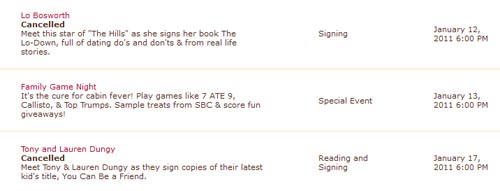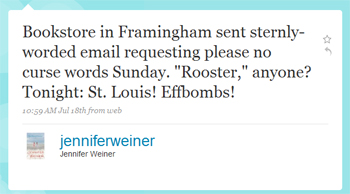Some commentators have considered recent financial setbacks within Borders to represent the beginning of the end for the forty year old bookstore chain. But another apocalyptic variable was presented on Thursday night when several Simon & Schuster author events were inexplicably listed as “canceled” on the Borders website without additional explanation. To add to the mystery, there was no indication on the Simon & Schuster website that the events had ever been scheduled at Borders in the first place.
On Thursday, The New York Times‘s Julie Bosman and Michael J. De La Merced reported that “several people said they were scrutinizing future print runs and examining the schedules of author events at Borders in February and March, with the expectation that they would be canceled.” Bosman and De La Merced did not name any specific sources, but an investigation has revealed that Simon & Schuster has taken steps to cancel events as early as next week.
The latest Simon & Schuster event that could be located on the Simon & Schuster website was a January 18th event in New York for author Chris Cleave. It’s possible that this event is still on because Mr. Cleave plans to arrive from England. The earliest canceled Borders event is January 12th (the Lo Bosworth event at Columbus Circle listed below), suggesting very strongly that a blanket scrubbing of
Simon & Schuster Borders events will kick in as of next week.
What follows is a comprehensive but by no means complete listing of store events that are presently listed as canceled (including two additional cancellations related to Penguin imprints). In the next few days, I’m hoping to get representatives of Borders and Simon & Schuster on the record to determine why this decision was made, and whether any alternative plans will be made to accommodate the authors.
2/17 — Mark Alpert (The Omega Theory, Touchstone)
1/12 — Lo Bosworth (The Lo-Down, Simon & Schuster’s Children’s Publishing) — It is worth noting that Ms. Bosworth is now appearing at a Barnes & Noble on the 12th.
1/17 — Tony and Lauren Dungy (You Can Be A Friend, Little Simon Inspirations)
2/8 — Taboo (Fallin’ Up, Touchstone)
1/15 — Marc Cendella & Matthew Rothenberg (You’re Better Than Your Job Search, Downtown Bookworks)
1/27 — Patricia Briggs (Silver Borne and River Marked, Ace) — Ace is a Penguin imprint, not Simon & Schuster. But this Borders event is not listed on Ms. Briggs’s official website. But her website indicates that she’s still signed on to hit a few Borders stores during her River Marked tour.
2/5 — Kelly Simmons (The Bird House, Washington Square Press)
Phoenix, AZ — Camelback – Borders
1/21 — Marc Cendella & Matthew Rothenberg (You’re Better Than Your Job Search, Downtown Bookworks)
1/20 — Lo Bosworth (The Lo-Down, Simon & Schuster’s Children’s Publishing)
Washington DC — Friendship Heights
1/22 — Jodi Picoult (Sing You Home, Atria)
3/3 — Mike Huckabee (A Simple Government, Sentinel) — Sentinel is a Penguin imprint. It’s also possible that there was a scheduling conflict with Huckabee’s schedule. (In light of the fact that Patricia Briggs — also a Penguin imprint — has been canceled, it is very possible that Penguin may have offered a few peremptory cancellations. Some inside sources are suggesting very strongly to me that Penguin has stopped shipping books to Borders, although I’m hoping to corroborate this with an official statement.)
Investigations into these developments are ongoing. I hope to have more information in the next few days.
1/7/11 EARLY AM UPDATE: I’ve contacted numerous authors about these developments, hoping to shed some additional light on the story. Kelly Simmons, author of The Bird House, informed me this morning that her S&S publicist did fill her in on the Borders developments, but that she had been following the story shortly after the Borders announcement.
“Showing up for an event at a bookstore that doesn’t have plenty of stock of my two novels — Standing Still and The Bird House — for me to sign — that would be a freaking nightmare,” said Simmons, who pointed out that chain bookstore appearances are more important for a top-selling author than a literary one.
Simmons also noted Borders’s recent reputation for not working well with authors. But does a Borders appearance even make that much of an impact? Simmons’s promotional efforts have been more devoted to book clubs, but she says that Barnes & Noble stores and independent bookstores “are very good about being involved in reading groups.”
Still, Simmons regrets the canceled appearance. She reports that “the Bryn Mawr/Rosemont Borders is run by smart, book-loving people, and I know hundreds of readers in the area who would have attended the book launch event, so it was a bummer.” However, Simmons had scheduled two events the following week at independent bookstores.
“It’s always sad when a brand that started out so inventive and interesting can’t survive,” concluded Simmons. “And for many readers, their local Borders is the only bookstore for many miles around. That is the greatest loss.”
1/7/11 UPDATE II: Jodi Picoult, author of the forthcoming Sing You Home, also confirmed with me that her publicist had filled her in on the Borders financial mess. Picoult, who says that she has no input into any of her bookstore appearances, doesn’t believe that the book tour is the only driving force for sales. Nevertheless, the book tour allows Picoult “to personally thank the people who are reading my books — so it is a very important part of my publishing cycle.”
Picoult she says that Borders “has been a good friend to me as my career has progressed and I’m very sorry to hear that they are in dire straits.” While there is nothing yet listed on its events calendar, Politics & Prose will now be sponsoring the scheduled event in DC on January 22nd. The independent bookstore will be using the same offsite venue as Borders.
If Borders slides into oblivion, will this translate into more events with prominent authors at independent bookstores?
“Obviously if Borders collapses,” said Picoult, “I’ll have the opportunity to do events with some other bookstores I might not have been able to visit before because of timing and availability. That said, I certainly hope Borders comes through this latest struggle, and that I can continue to work with them in the future.”
1/7/11 UPDATE III: In an effort to get a complete story, I’ve tried to get comments from Borders and Simon & Schuster, contacting them by telephone and email. As of 10:30 AM EST, nobody has returned my calls. Another anonymous source suggests that nobody is interested in talking on the record.
1/7/11 UPDATE IV: The official word from Simon & Schuster: “No comment.”
1/7/11 UPDATE V: I have heard back from Borders spokesperson Mary Davis: “Borders stores host thousands of free enriching events each year, and that will continue. From time to time, events get canceled. Our schedule of events remains full.” I have asked Ms. Davis if it is Borders’s position that nine canceled events reflects an occasional or “time to time” cancellation. If I hear anything back, I will report it here.
1/7/11 UPDATE VI: Jodi Picoult just informed me that her DC event may still get sponsored by Borders after all. A final decision is expected in the next few weeks. Since Jodi Picoult’s books tend to sell very well (to be clear, “#1 New York Times bestseller” well), it’s quite possible that Picoult’s event is being used as a bargaining chip with Borders. Or maybe this is an effort to save face. We have only speculation to go on — since Simon & Schuster doesn’t wish to elaborate on “No comment” and Borders insists that its “schedule of events remains full.” I have emailed Barbara Meade at Politics and Prose to see if she might provide some additional input on what has become a cloudy matter.
1/7/11 UPDATE VII: I’ve heard back from Barbara Meade: “We were never contacted by Simon and Schuster. We are partnered with the 6th and I Historic Synagogue downtown, where we do some of our larger events and they contacted me to ask if we had any problem with their doing an event for Jodi Picoult that Boarders had contacted them about. I told them I didn’t have any problem with it because we didn’t
have any plans to do any event is Jodi Picoult. Our events schedule is completely filled two months into the future with ten events a week. We don’t have time for last-minute events.”
It would appear that this was more of an assumptive alternative.
1/14/11 UPDATE: On January 12, 2011, I appeared on New Hampshire Public Radio’s Word of Mouth to discuss the Borders situation with Sarah Weinman.


